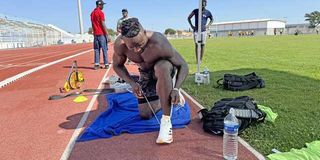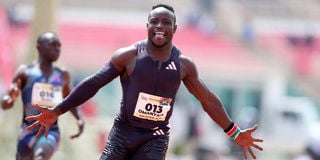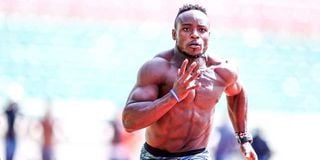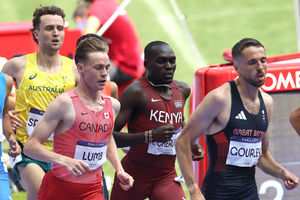
Ferdinand Omanyala prepares for training in Miramas, Southern France, last week.
“Go higher! go higher!.... let’s push!,” coach Geoffrey Kimani shouts trackside, arms folded as he strolls on the red synthetic track, closely monitoring Ferdinand Omanyala’s resistance band workouts.
Africa’s fastest man is pushing himself to the limit, and can’t afford to put a foot wrong. The strain is clearly etched on his face, but even then, he manages the occasional, infectious smile.
It’s not that he has a choice, anyway. He has to work hard! Omanyala has spent a fortnight at Team Kenya’s pre-Olympics training camp in Miramas, Southern France, where Olympic sprinters, sevens rugby team, swimmers, women’s volleyball team and lone judoka pitched camp.
The Miramas camp – located in the serene Hotel Ariane – in Fos-sur-Mer was the offshoot of a tripartite partnership between the National Olympic Committee of Kenya, the City of Miramas and the Kenyan government.
It was Omanyala’s final stop ahead of today’s opening heats of the 100 metres at the Paris 2024 Olympic Games.
So intense was the training under no-nonsense coach Kimani, a former sevens rugby and volleyball strength and conditioning coach, that Omanyala, 28, even thought of quitting at some point, but the reward of an Olympic medal at the Stade de France this week was too inviting to resist.
“Ferdie” is in love with the tranquility of Miramas. “Miramas has been my second home because every time when I’m competing outdoors, I like coming here to enjoy the space, the peace and great welcome that I was given from when I first set my foot here,” he tells ‘Nation Sport’ in an exclusive interview in the French city.

Ferdinard Omanyala celebrates after winning the 100m final during the Olympics Trials on June 15, 2024 at Nyayo National Stadium.
“It has been an awesome journey and I’m happy that I grow every time I come here and meeting a lot of people who want to be associated with me, and to help me, motivates me.
“As pro athletes, we move around the world so much and when you get someone who appreciates that, and takes care of things. it makes it easier.” Omanyala started off as a rugby player, honing his skills at Nairobi’s Railway Club, home of “black shirts” Mwamba RFC.
“I played rugby in high school… I was just fast. But then again, I used to run away from my parents whenever I made a mistake, and they couldn’t catch me,” he joked.
“In high school, I could never in my wildest imagination have ever thought I would be where I am. Sprints not a thing for Kenya…” His first “encounter” with sprints was in 2004 when he watched American Justin Gatlin win the Olympic 100m gold in Athens. Omanyala would then give it a shot at a weekend meeting in Mumias a few years later.
“I was told by one of my rugby teammates that there was a track meeting in Mumias. Still wearing my rugby shorts, I just went there to run, and I won the event… I was given Sh5,000 which was a lot of money at the time,” he recalls. A newspaper article reporting on the Mumias competition then boosted his confidence further.
“Having my name in the newspaper for the first time was a big deal, because to be in the newspaper, you were either dead and there was an obituary, or maybe you have done something extraordinary, like being top in class. “I was so excited and my dad bought the newspaper… It was something big for our family… I realized this (sprints) is something I’d like to do. I wanted to do this more and more.”

Commonwealth Games 100m champion Ferdinard Omanyala trains at Nyayo National Stadium on May 3.
Back at the Railway Club, Omanyala admired the jet-set life of the rugby stars, like brothers Collins Injera and Humphrey Khayange.
“I wanted to be stars like them… I had their images in my box in high school.”
But his first major break was at the trials for the 2016 Rio Olympics which were held at a packed Kip Keino Stadium in Eldoret.
“It was the first time I was competing in a packed stadium… that was the event that started putting my name in people’s minds.
“As much as I didn’t qualify for the Rio Olympics, I ran 10.35 seconds which was very fast at the time, and especially for a rookie barely in the sport for six months.
“What motivated me was getting better every day… I was also watching the videos of the likes of (Jamaica’s) Yohan Blake and I admired their lives, how they were travelling all over the world, and their kit sponsors. I used to tell myself ‘that is the life I want!’”. As he got more focused, Omanyala enlisted Duncan Ayiemba as his coach.
“I started working out with my coach in January, 2016. He was an athlete like us before, but wasn’t doing it at a high level because he was studying at the time.”
Meanwhile, Omanyala was also balancing sport and education, pursuing a Bachelor of Science in degree in chemistry at the University of Nairobi. “One of my relatives did a Bachelor of Science in Chemistry degree and encouraged me, and that’s why I chose the course at Chiromo.
“I was looking forward to working at a pharmaceutical company, but now I want to mix it with forensics.”
Forensics? Yes, because Omanyala is also a policeman, having been recruited for his running talent… “After my athletics career is over, I’d like to get into forensics and help the DCI (Directorate of Criminal Investigations) with the knowledge that I have,” he looks forward.
“What inspired me to join the police force is the fact that opportunities come and go…. “When I was approached by the National Police Service and they offered me a job, I looked at my future and said it’s a good opportunity after athletics. “After I retire, I’d like to manage athletics in the police, and the forces in general. It’s an opportunity God has presented.” This season has been well though-out by Omanyala who “disappointed” his home fans with a fifth place 10.03 seconds at the Kip Keino Stadium. American Kenneth Bednarek won the race in 9.91 seconds. But Omanyala later bounced back with a world lead 9.79 at the National Trials for the Paris Olympics just over a month ago. He explains the circumstances:
“I changed my coaches at the start of the season because things weren’t working out, and I was running so fast so early in the season. “I did 9.81 seconds, 9.86 and 9.94 in February (last year)… If these times were at the World Championships in Budapest (in August), I could have been in a good place. “Realising that I will only be in the sport for a short time, I really wanted a coach who could understand how to balance and to make things work.
“I’m talented and when I’m in good shape, I can compete with anyone in the world… In the previous two seasons we were peaking too early, running fast times in February, March, April and then by June, July and August we had faded out, struggling to run 10.1s, 10.2s or 10.00s and that’s when the championships are.
“This season has been about trusting the process. We had already peaked for the indoors season, ran two national records, so my current coach said we can’t peak early in the outdoor season yet. “We agreed we should maintain 10.0 seconds and when we start hitting it hard, we hit it hard… the 10.0 seconds part came during the Kip Keino Classic (in April). “We also reduced the number of races… My coach said ‘you can’t be racing everywhere. You need to be psyched up when you do for the big races.’
“Like now I’m so psyched up. I’ve done only 600 metres (six 100m races) this year and I’m really psyched up to get into the Olympics because I’m not tired mentally from travel, competitions etc. “Kip Keino Classic was my first race and I was telling people ‘one time you will realise why this (fifth place finish) happened.’
“My team was not frustrated. It was the fans who were frustrated because they didn’t know what was happening…” The preliminary rounds of the 100m at the Paris Olympics will start off at 10.35am (11.35am Kenyan time) today for runners with slower times, with the heats proper from 11.55am (12.55pm, Kenyan time). Tomorrow will see the semi-finals at 8pm (9pm Kenyan time) and the eagerly-awaited final at 9.50pm (10.50pm Kenyan time), also tomorrow night. SuperSport will televise all the action, live from Paris.









